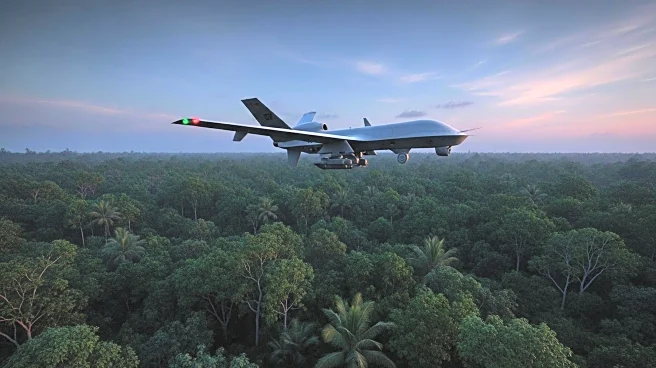What's Happening?
The Trump administration has initiated a military strike against a vessel off the coast of Venezuela, targeting members of the Tren de Aragua gang, which has been designated as a foreign terrorist organization. This action is part of a broader strategy to combat Latin American drug cartels accused of smuggling drugs into the United States. The strike has sparked debate over its legality, as Congress has not authorized the use of force against Venezuela, nor are there any U.N. resolutions supporting such actions. The administration cites self-defense and an immediate threat to justify the strike, but legal experts question the validity of these claims.
Why It's Important?
The military strike represents a significant shift in U.S. drug interdiction policy, potentially setting a precedent for future military actions against drug cartels. This approach could impact international relations, particularly with Venezuela, and raises concerns about the blurring of lines between law enforcement and military operations. The legality of such actions is under scrutiny, with implications for U.S. adherence to international law and the potential for escalating tensions with foreign governments. The move could also affect U.S. diplomatic relations and cooperation with other nations in drug enforcement efforts.
What's Next?
The Trump administration has indicated that more military strikes on drug targets may occur, as it seeks to intensify its efforts against Latin American cartels. Congressional leaders are pressing for more information on the strike, and the Pentagon has remained silent on operational details. The administration's actions may prompt responses from Venezuela and other affected countries, potentially leading to diplomatic or military repercussions. The legal and ethical implications of these strikes will likely continue to be debated, influencing future U.S. policy decisions.
Beyond the Headlines
The strike raises ethical questions about the use of military force in drug enforcement and the potential for extrajudicial killings. It challenges the established legal framework for drug interdiction and could lead to long-term shifts in U.S. policy and international relations. The designation of drug cartels as foreign terrorist organizations complicates the legal landscape, potentially expanding the scope of military operations beyond traditional conflict zones.









